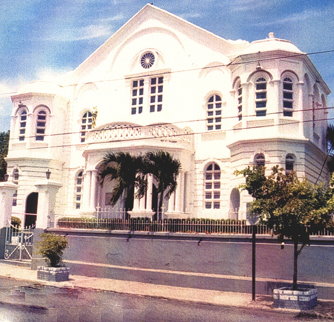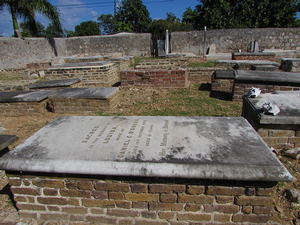By Eron Henry

In the late 1980s into the early 1990s, while serving in Rock River, Clarendon, in Jamaica, one person, a history hobbyist, told me that several residents in the small town were likely Jewish descendants but didn’t know it.
He said the last names of some residents were Jewish in origin, such as Levine, and asserted that among the earliest settlers in communities nearby were Jews from Portugal. This, he said, is borne out by Rio Minho, the river, which flowed just a few miles from Rock River and into which the river, which gives the town its name, flows as a tributary. Rio Minho is Portuguese. The name is probably from the Latin, minius, meaning lead, or vermilion; essentially, “the red river.”
Early Jewish settlers
Evidence is strong that Jews were among the first settlers on the island when Columbus got lost and stumbled there in 1494. In an article published in the July 1, 1900, edition of the The Jewish Quarterly Review, M. Kayserling said, “when the English occupied the island [in 1655] … they found already Spanish and Portuguese Jews settled there.”
Jamaica provided Jews relative freedom from religious persecution. “Columbus was favorably disposed toward the Jews,” according to an article in the March 1967 edition of the Caribbean Quarterly. “Excluding the Inquisition from the island, [Columbus] rendered their settlement easy.” Irwin Berg said “Jews from the Iberian Peninsula, but mainly Portugal, settled in Jamaica beginning about 1530 CE to avoid the Inquisition that was making their secret lives miserable and dangerous.”
Jews in Jamaica are of an eclectic background, both Sephardic and Ashkenazi and from various cultures. The Caribbean Quarterly, claimed:
In 1662 Jews came from Brazil, in 1663 from England, in 1664 from British Guiana, in 1673 from Surinam. During the eighteenth and early nineteenth centuries, Jews came to Jamaica from Curacao and Germany. Then the influx of Jews appeared to have ceased or considerably diminished until the new migrations from Syria, Egypt and elsewhere in the late nineteenth and early twentieth centuries.
Among the first Jewish settlers in Jamaica in the wake of the British conquest were Benjamin and David Bueno de Mesquita of a wealthy and notable family in Amsterdam, Netherlands.
Others included the Israel de Pisa brothers, Isaac, Aaron and Abraham; as well as Jacob Ulhoa, Abraham Soarez, Benjamin Bueno de Mesquita and Abraham Cohen. These persons were expelled from Barbados by the governor and relocated to Jamaica.
Other Jews were “Bueno Enriques, who lived in the Punta de Cagoe in Jamaica, and who was called by the English ‘the French Jew,’ on account of his frequent intercourse with the French…. We see, therefore, that as early as I660 several Jewish families lived at Jamaica,” Kayserling wrote.
Some British and Amsterdam-based Jews were allowed in Jamaica on condition that they took the oath of allegiance before the governor. “Thus in the year I668, Salomo Gabay Faro and David Gomes Henriques, two years later Abraham de Soza Mendes, and in I67I Abraham Espinosa and Jacob de Torres came from London.” Others included Henriques Cotinho, or Coutino, from Barbados and Abraham Lopez Telles, who came from Amsterdam and London.
The most noted and respected Jew who lived in Jamaica in the early years was the Spanish poet Daniel Israel Lopez Laguna, who died on or around 1730.
Antisemitism
Like most of the richer classes, Jews used African slave labor in their mines, businesses, and on their properties, but they themselves faced discrimination and endured much anti-Semitism from the British. “They mostly occupied themselves with trade, and opened large shops,” Kayserling wrote.
This aroused the jealousy of the English traders to such an extent, that, in I671, they presented a petition to the council, urging that the Jews should confine themselves to wholesale commerce, and leave the retail trade in the hands of the Christian traders, and that all Jews who had not been naturalized should be expelled.
The governor opposed the expulsion petition “as being against the interests of the island, for he was of opinion that His Majesty could not have more profitable subjects than the Jews and the Hollanders; they had great stocks and correspondence.”
Though their rights were generally preserved, Jews were more heavily taxed. A special tax was imposed in 1693:
Should one of the persons rated refuse to pay, payment would be legally enforced, his slaves or chattels would be confiscated and publicly sold; if no goods could be found, the recalcitrant person would be arrested and detained in custody, till payment should have been made.
A series of other onerous taxes followed:
They were not able to bear such a crushing burden of taxation; they were a comparatively poor community of not more than eighty persons; and had besides to provide for the wants of their poor.
The authorities justified the taxes on what they deemed to be the relative success of the small Jewish population relative to their white, British counterparts:
Their taxes bore no proportion to their large trading establishments, and that they must proportionally pay more than the English, whom they had beaten out of the field by their commercial capacities.
Toward the end of the 18th century, Jews “were precluded, like negroes, Indians, and mulattos, ‘from being employed clerks or any of the judicial or other offices.’”
Synagogues
Whereas there is now only one Jewish synagogue in Jamaica, the Shaare Shalom Synagogue or the United Congregation of Israelites on Duke Street in Kingston, Jamaica’s capital, there were several, perhaps as many as seven, in the past. The first was believed to have been founded in Port Royal, the former capital. Most of the synagogues were destroyed either by hurricane, earthquake or fire. The current synagogue itself was constructed in 1912 to replace an earlier one destroyed by either a violent storm or the 1907 earthquake (sources I’ve read differ as to the cause).
The 1906 edition of the Jewish Encyclopedia reported that:
Spanish Town had two Jewish congregations between 1840 and1845. A synagogue is mentioned by local historians as having been established about 1684; it is referred to in the Journal of the House of Assembly in 1687. The Spanish and Portuguese synagogue of Kingston, situated in Princess street until the time of its destruction by fire in 1882, was consecrated in 1750. The English and German synagogue was consecrated in 1789, a new synagogue taking its place in 1837.
The fire mentioned above occurred on December 11, 1882. “A calamitous fire occurred in Kingston… by which the greater part of the business portion of the town was destroyed, much valuable property consumed and great distress occasioned to the poorer classes,” the Handbook of Jamaica, first published in the late 19th century, recounted. The Handbook indicated that after the fire, attempts were made to unite the two congregations in Kingston, but distrust and disunity prevailed:
Soon after the eventful conflagration, a complete union of the entire Jewish Community was contemplated, but owing to some difficulties which arose with regard to the Ritual, a good number of the members of the Spanish and Portuguese Congregation under the leadership of the late Mr. David Martin, withdrew from the movement and erected a small but handsome Synagogue in East St. which was consecrated on the 3rd of September, 1884.
The disunity did not end there:
A very small number of the members of the English and German Congregation also withdrew from the proposed Union, but owing to want of means, their Synagogue remained in ruins until 1893 when it was re-built and consecrated on the 23rd of September, 1894. Services have since been regularly held there. The Rev. M. H. Solomon is the Minister.
The other Jews in Kingston formed a united congregation and constructed a new place of meeting on Duke Street, laying the foundation stone in August 1885 and consecrating the new building on July 19, 1888. It is this building that was destroyed and rebuilt.
Two of the synagogues were united on December 28, 1900, “when the Amalgamated and Spanish and Portuguese congregations, united and now worship under one roof.”
Jewish cemeteries

Cemeteries point to Jewish presence from the earliest times and at various locations across the island. Jamaica has had as many as 21 Jewish cemeteries, but the New York Jewish Week indicated that only about 13 are known or are being maintained.
Writing for the Jewish Journal in October 2012, Roberto Loiederman said:
The oldest of Jamaica’s Jewish cemeteries, at Hunts Bay, west of Kingston, has been explored by the International Survey of Jewish Monuments, which found a gravestone with Hebrew and Portuguese writing. That gravestone is dated 1672.
When the May Pen Cemetery, Jamaica’s largest, was officially commissioned in Kingston in the 19th century, separate burial grounds were designated for the Spanish and Portuguese Jews and the German Jews.
While I was in Falmouth on Jamaica’s north coast in the 1990s, I lived within walking distance to the old Jewish cemetery, which was in general neglect at the time. The cemetery attests to the past “where prosperous Jewish families once lived” in the town, said the USA Today. “The numbers of graves in the Jewish cemetery suggest that there must have been a substantial Jewish community in Falmouth,” Irwin Berg wrote.
Falmouth now has an international harbor that welcomes mega cruise ships. “The 200-year-old Falmouth Jewish cemetery lies a mere two-minute stroll from the harbor,” the New York Jewish Week noted. Falmouth Jewish Heritage Walks include the cemetery, now maintained, and which has 130 marked graves.
Berg said the following concerning Montego Bay:
There were at one time two Jewish cemeteries in Montego Bay…. The older of the two cemeteries has disappeared. What we know is that it closed for burials in 1898. The cemetery measured 120 feet by 90 feet. The ground was sold sometime before 1958, and it is now occupied by the Churches Corporate (sic) Credit Union.
Jamaica never had a large Jewish community. In 1900 there were only about 2,400 Jews on the island out of a total population of just under 645,000. David Grossman, writing for the Canadian Jewish News in 2012 claimed that the Jewish population “at one time was believed to be greater than 5,000, but has since dwindled to about 200 people.”
Jews, nevertheless, have as strong a claim on the island as any other religious or ethnic group. They have deep roots there, much deeper than is commonly thought. And if my history hobbyist in Clarendon is right, there may be many “black” Jews walking around without knowing that part of their heritage.
Eron Henry is author of Constitutionally Religious: What the Constitutions of 180 Countries Say About Religion and Belief and the novel, Reverend Mother.